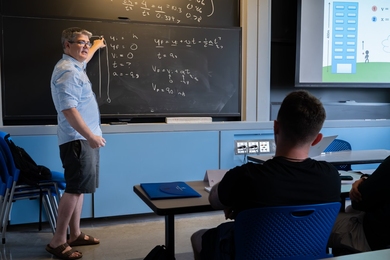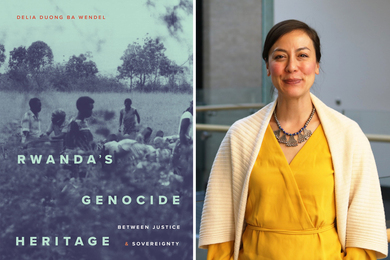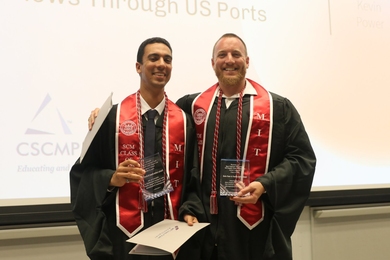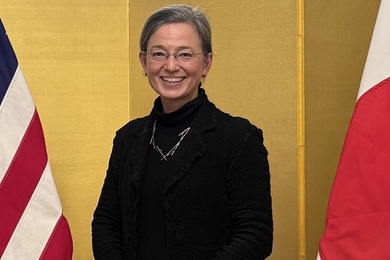Sharing a muddy crawl space with four roommates isn’t part of the traditional path to a law degree. But that’s exactly how Veasna Chea, a Cambodian woman, lived during law school in the mid-1990s — still managing to graduate first in her class.
Speaking on Thursday night, Alan Lightman, adjunct professor of the humanities at MIT, described his serendipitous meeting with Chea during a 2003 visit to Cambodia as his inspiration to establish a foundation that helped build the first college dormitories for young women there. Unsettled by the fact that Chea was only the fourth woman in Cambodia to attain a law degree, Lightman vowed to help Cambodia’s women exercise greater power in the country.
The barriers to women’s education in Cambodia have their roots in the nation’s tragic and bloody history. More than 30 years after the Khmer Rouge decimated the educated class as part of its campaign of genocide, this country of 14 million — one of the poorest in the world — still faces challenges in rebuilding its educational system. Most of the rural population lives in one-room shacks with no running water or electricity. Millions of young women have no way of attending college, mainly due to financial constraints (the annual cost of tuition, room and board is roughly three times the average Cambodian family’s income) and the lack of housing for women in Phnom Penh.
A physicist and best-selling author, Lightman has added social entrepreneurship to his life’s work, volunteering 50 percent of his time to lead the Harpswell Foundation, an organization he founded in 2003 to address these issues.
“Our goal is that our graduates will become leaders of Cambodia,” Lightman told a packed hall in the Stata Center. “In 20 years we’d like our … graduates to be heads of hospitals, government ministers, and directors of NGOs. We’d like to see 200 Hillary Clintons, Sandra Day O’Connors and Oprah Winfreys.”
Lightman is personally involved in the selection process for Harpswell’s two dormitories, helping to choose each year’s new class of 20 residents out of a pool of 160 students. (The top four female students are interviewed at each of Cambodia’s top 40 high schools.) The strategy, he explained, is to select not only the brightest students for admittance to the dormitories, but also those with leadership potential.
Those chosen live — free of charge — in one of Harpswell’s two dormitories and leadership centers in Phnom Penh. With 90 percent of young Cambodian women hailing from rural areas, housing is essential for them to attend one of the 15 universities in the capital. While Cambodia’s male college students are typically housed in Buddhist temples, women are prohibited in the pagodas and often have no alternative but to skip college altogether — leading many to early marriage, work in the rice fields or prostitution.
The first Harpswell dormitory, built in 2006, is a three-story building that houses 35 women. The second, completed in 2010, houses 45 women. Both also function as leadership centers where the residents receive food and medical care, along with free classes in English, computer skills, leadership seminars and discussion of national events to develop critical thinking skills. The foundation gives each student a $30 monthly stipend for food and expenses.
When an audience member asked how the public can help, Lightman shared that in addition to donations, he is always looking for women from outside of Cambodia to act as leadership residents in the dorms. Last November, 50 Harpswell students and staff had the opportunity to meet with U.S. Secretary of State Hillary Rodham Clinton at a meeting organized by Carol Rodley, the U.S. ambassador to Cambodia.
Of the 30 female students in Harpswell’s first two graduating classes, seven now work in Cambodia’s top law firm, and approximately 10 have come to the United States for postgraduate study. While Harpswell may construct additional dormitories in the future, Lightman said he’s determined to maintain his personal relationships with the students.
“I have individual meetings with each of the 80 students — this personal contact is a very important part of the culture of our dorm,” he said. “They feel like somebody really cares about them.”
Speaking on Thursday night, Alan Lightman, adjunct professor of the humanities at MIT, described his serendipitous meeting with Chea during a 2003 visit to Cambodia as his inspiration to establish a foundation that helped build the first college dormitories for young women there. Unsettled by the fact that Chea was only the fourth woman in Cambodia to attain a law degree, Lightman vowed to help Cambodia’s women exercise greater power in the country.
The barriers to women’s education in Cambodia have their roots in the nation’s tragic and bloody history. More than 30 years after the Khmer Rouge decimated the educated class as part of its campaign of genocide, this country of 14 million — one of the poorest in the world — still faces challenges in rebuilding its educational system. Most of the rural population lives in one-room shacks with no running water or electricity. Millions of young women have no way of attending college, mainly due to financial constraints (the annual cost of tuition, room and board is roughly three times the average Cambodian family’s income) and the lack of housing for women in Phnom Penh.
A physicist and best-selling author, Lightman has added social entrepreneurship to his life’s work, volunteering 50 percent of his time to lead the Harpswell Foundation, an organization he founded in 2003 to address these issues.
“Our goal is that our graduates will become leaders of Cambodia,” Lightman told a packed hall in the Stata Center. “In 20 years we’d like our … graduates to be heads of hospitals, government ministers, and directors of NGOs. We’d like to see 200 Hillary Clintons, Sandra Day O’Connors and Oprah Winfreys.”
Lightman is personally involved in the selection process for Harpswell’s two dormitories, helping to choose each year’s new class of 20 residents out of a pool of 160 students. (The top four female students are interviewed at each of Cambodia’s top 40 high schools.) The strategy, he explained, is to select not only the brightest students for admittance to the dormitories, but also those with leadership potential.
Those chosen live — free of charge — in one of Harpswell’s two dormitories and leadership centers in Phnom Penh. With 90 percent of young Cambodian women hailing from rural areas, housing is essential for them to attend one of the 15 universities in the capital. While Cambodia’s male college students are typically housed in Buddhist temples, women are prohibited in the pagodas and often have no alternative but to skip college altogether — leading many to early marriage, work in the rice fields or prostitution.
The first Harpswell dormitory, built in 2006, is a three-story building that houses 35 women. The second, completed in 2010, houses 45 women. Both also function as leadership centers where the residents receive food and medical care, along with free classes in English, computer skills, leadership seminars and discussion of national events to develop critical thinking skills. The foundation gives each student a $30 monthly stipend for food and expenses.
When an audience member asked how the public can help, Lightman shared that in addition to donations, he is always looking for women from outside of Cambodia to act as leadership residents in the dorms. Last November, 50 Harpswell students and staff had the opportunity to meet with U.S. Secretary of State Hillary Rodham Clinton at a meeting organized by Carol Rodley, the U.S. ambassador to Cambodia.
Of the 30 female students in Harpswell’s first two graduating classes, seven now work in Cambodia’s top law firm, and approximately 10 have come to the United States for postgraduate study. While Harpswell may construct additional dormitories in the future, Lightman said he’s determined to maintain his personal relationships with the students.
“I have individual meetings with each of the 80 students — this personal contact is a very important part of the culture of our dorm,” he said. “They feel like somebody really cares about them.”






